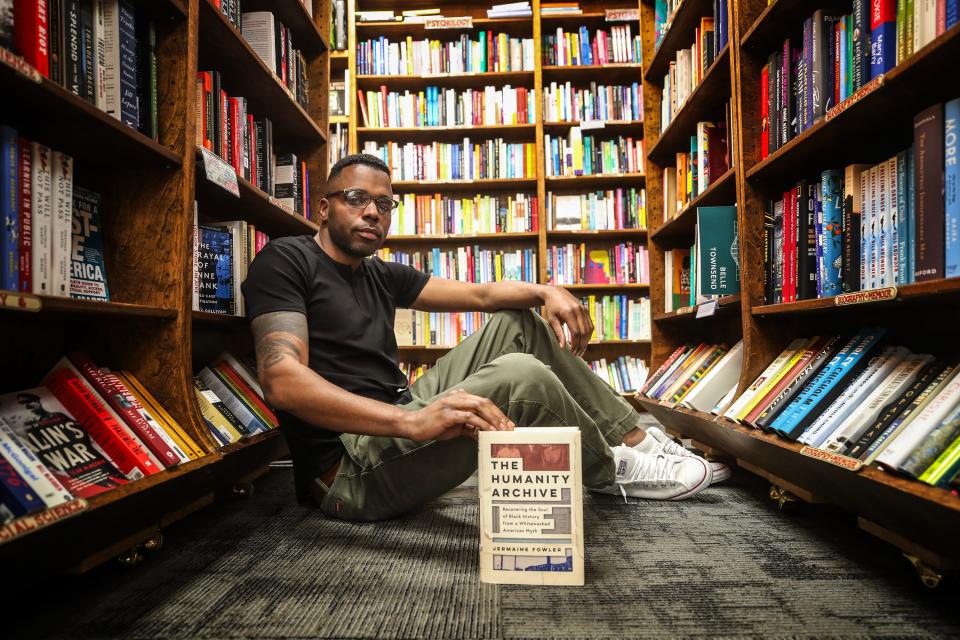'The Humanity Archive': Louisville author says journey to NYT best seller began in library
- Oops!Something went wrong.Please try again later.
The newest author from Louisville to land a book on the New York Times Best Sellers list says his story — even the book itself — all starts in the main downtown branch of the Louisville Free Public Library.
"I used to catch the TARC bus to the main library and spent whole summers in there, really," said Jermaine Fowler, whose debut book, "The Humanity Archive," entered the best sellers list for hardcover nonfiction in March.

"There were a lot of kids playing football or sports or other things. My thing was books and the library was like my go to. I would go spend hours going through the shelves, just reading my way out of the library."
Fowler's underdog journey to becoming a bestselling author of a history book was circuitous, but he says it all stems from his passion for books and knowledge of the past — beyond what he was taught in classrooms — that was nurtured by the library and never went away.
Opinion: Ricky Jones: Republicans are not dumb, they've been led astray. GOP heroes are using them.
"The Humanity Archive" stems from his podcast of the same name that he launched in early 2020, both of which mostly seek to share underreported and whitewashed parts of Black history, weaving those stories of peoples' struggles and triumphs within the larger context of American history, where they belong.
"I wanted to take everyone on that journey of how I found my own history, or Black history, in the library, and then tie that into the larger lens of Black history going back," he said.
Fowler, 39, grew up near Pleasure Ridge Park, graduating from Butler Traditional High School. Both of his parents were teachers, which he says set an example of educating and sharing knowledge that "had a great impact on my decision to do what I'm doing now."
"They used to call me the professor when I was a kid, because I'd walk around with my dad's briefcase."
But Fowler did not pursue a degree or career in history or education, studying architecture and business at Western Kentucky University. He lived in Savannah, Georgia, before moving back to Louisville in 2020, when he decided to launch the podcast.
Boosted by a promotion that summer in Vanity Fair, the podcast took off and gained followers and listeners — which he juggled along with his 9-to-5 business management job and his wife and two kids.
Fowler said his podcast sought to deliver the type of historical information mostly confined to academia, but package it in storytelling that is accessible to everyone else.
Opinion: Editing education maintains racism, sexism, classism and unearned elitism
"A lot of people in the universities are kind of writing for each other and the general public's not getting a lot of that information," Fowler said. "I've always been a meticulous reader and researcher, so I wanted to see how could I bridge that gap and give people in the public that in-depth information, but in a very engaging and entertaining way."
His time-consuming passion project became more serious in late 2021, when Fowler landed a book deal with Row House, a small "disruptive" publisher. He spent most of 2022 writing the book, along with producing his podcast and related videos on social media.
Fowler's book was released Feb. 28, and while he was able to get a few write ups in national publications and knew he had a loyal base of fans with his podcast, he was still floored when "The Humanity Archive" debuted on the New York Times Best Sellers list.
"I jumped out of my seat in excitement," Fowler said. "It was just a surreal moment, but a very refreshing moment and validating moment."
With his success and Patreon backers, Fowler was able to quit his 9-to-5 job, allowing him to devote more time to his family and "fulfill the dream of following your passion and doing something that you see as your purpose."
"That was another validating moment, to be able to leave my job and do this full time ... to be able to focus just on the business and my kids, I can't even put into words how impactful that was for me."
Part of his business now is selling companion courses with his book, but he notes that many Republican-led states have passed legislation in the past two years restricting how civil rights history and race in America can be taught in classrooms — which he says may well keep his material out of some schools.
More: What happens when conservative school boards gain power at districts around the country
Among the backlash in many states, Fowler cited schools in Tennessee, Texas and Florida seeking to ban the autobiography of and documentary about Ruby Bridges, who at 9 years old in 1960 was the first Black student to integrate an all-white Louisiana school.
Fowler calls this movement "wrongheaded at its core," saying "in essence it's a war on the truth and it's denying the voices and experiences of Black people and other marginalized groups."
In Kentucky, a bill was passed into law last year to restrict teaching that racial inequities are solely caused by the nation's legacy of slavery, segregation and racial discrimination, with Fowler noting Republican candidates' recent attacks on those who are "woke" — a decades' old slang in Black culture for being aware of social injustice.
"It seems to me to be a smokescreen for race, a dog whistle for racial issues that they don't want to talk about directly," Fowler said, adding that it is "riling their base" and creating "a feedback loop of ignorance."
Reach reporter Joe Sonka at jsonka@courierjournal.com and follow him on Twitter at @joesonka.
This article originally appeared on Louisville Courier Journal: 'The Humanity Archive': NYT best seller Jermaine Fowler credits library

